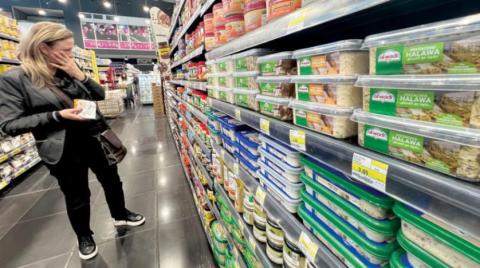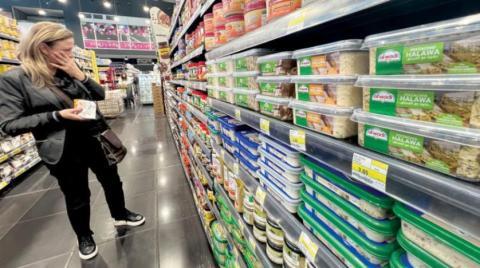
A recent move by Lebanon’s Central Bank (BDL) to offer to sell the cash dollar through its platform at the rate of LBP 70,000 has temporarily curbed the rapid collapse of the national currency.
The price margins of cash trading in the parallel markets fell to around LBP 80,000 per dollar, after touching the barrier of LBP 100,000 only minutes before the BDL decision was issued on Wednesday night.
Government services and fees, which are collected based on the BDL Sayrafa platform, increased overnight by about 55 percent, especially public electricity and communications bills.
Many factors converge in Lebanon’s consumption markets, signaling unprecedented rises in inflation levels, which could put the country ahead of Zimbabwe, in terms of high food prices in particular, and the cost of living in general.
Asharq Al-Awsat monitored the activity of banks, which have reprogrammed their information networks to comply with the new decision of the Central Bank and to issue the necessary instructions to branch managers and employees.
However, it was noticed that many of them deliberately set special standards that impose compliance with the requirements of “Know Your Customer” and determine the source of liquidity in Lebanese pounds, to avoid exportation through currency exchange operations with money changers.
Experts and analysts agree that the cumulative inflation index, which doubled from about 990 to 2,200 percent last year, will not require more than half of the time period, i.e. the middle of the current year, to achieve a new double jump, unless positive internal developments occur.
Those are particularly related to the election of a president of the republic, the formation of a new government, and the issuance of a package of laws for an agreement with the International Monetary Fund (IMF), which is conducting a new field assessment through a team that will visit Beirut next week.
Market traders and dealers told Asharq Al-Awsat that the 9 percent increase in prices, which was recorded at the end of the first month of 2023, is nothing more than the tip of the inflation iceberg, under which gloomy indicators lurk. Some of the data are likely to appear at the end of the first quarter, they remarked.
The continuous collapse of the Lebanese pound is inevitably reflected in prices, primarily those of food commodities and fuels, followed by basic expenditures, such as the supply of electricity from private generators, transportation, water and other daily life necessities.
At the same time, the Ministry of Finance began collecting customs duties according to the updated pricing, which is based on calculating the dollar at a price of LBP 45,000, which is equivalent to three times the price adjusted a few months ago, i.e. LBP 15,000 per dollar.
Preliminary estimates point to automatic increases, ranging between 5 and 15 percent, on the prices of goods subject to customs duties, with the exception of food commodities, medicine, medical supplies, and other basic materials.
Estimates also suggest that the government, under pressure to meet wage increases, allowances, and aid for about 330,000 public sector employees, will resort to additional adjustments in calculating the costs of public services and fees, to become closer to the price of the black market.
In fact, private educational and hospital institutions and telecommunications companies resorted to pricing the services in “fresh” dollars, partially or completely. This was seen in the unprecedented rise in telecommunications prices by 331 percent during the second half of 2022.
Similarly, the cost of health services (medicine, hospitalization and medicines) increased by 176 percent. Education costs have also augmented by more than 191 percent, bearing in mind that social and health benefits have shrunk to minimum levels, as health coverage available from public funds now ranges between 5 and 20 percent of the real cost incurred by employees in the public and private sectors.












